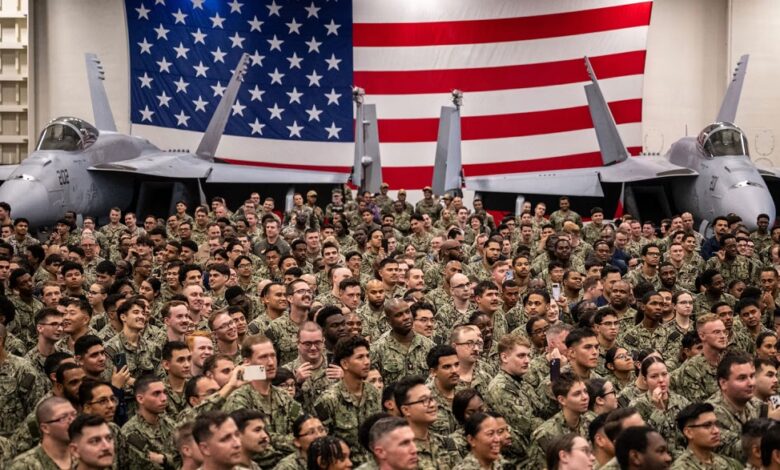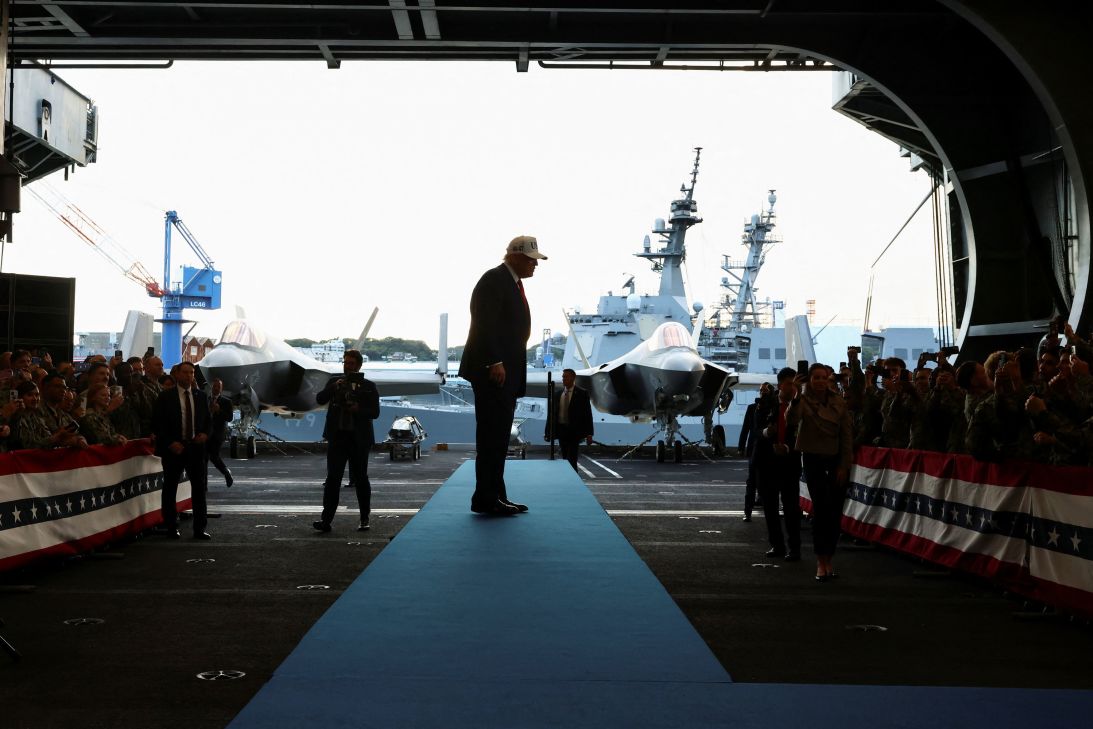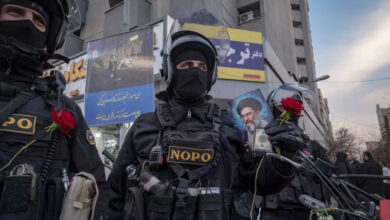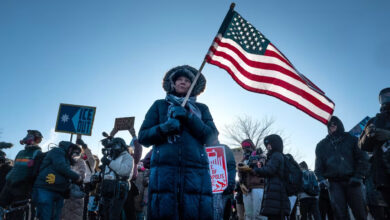
What’s the difference between the flight deck of a mighty US aircraft carrier and a MAGA rally? Not much in the mind of President Donald Trump.
The commander in chief used a speech on the USS George Washington, moored in Japan Tuesday, to revive 2020 election falsehoods and to campaign for his constitutionally questionable plan to send troops into US cities.
Once, such political activity using the military as a backdrop would have provoked shock back home. But Trump has infringed so many customs of the presidency that it came as no surprise.
The president recently had service members cheering a deeply partisan speech at Fort Bragg, North Carolina, that troubled many former senior officers. He staged a parade through Washington to mark the Army’s 250th anniversary — which coincided with his birthday. He rambled in a speech before top brass flown from around the globe in Virginia last month. The generals and admirals were also treated to an anti-“woke” screed from Defense Secretary Pete Hegseth. Most notoriously, in his first term, Trump enlisted Gen. Mark Milley to march with him after demonstrators were cleared from outside the White House. The then-chairman of the Joint Chiefs of Staff apologized for being pulled into domestic politics and landed on Trump’s forever enemies list.
Trump made a spectacular entrance Tuesday before hundreds of sailors and service personnel, descending on a huge elevator with military jets as a backdrop. His speech on the USS George Washington was a classic weave. He claimed to have dreamed of being an admiral and indulged his obsession about the best way to power catapults that carriers use to launch their warplanes into the sky.
But he also touched on fiercely political issues in front of nonpartisan officers and enlisted personnel, previewing an expansion of his effort to send troops into US cities in a constitutionally questionable crime and immigration purge.
“We have cities that are troubled. We can’t have cities that are troubled and we are sending in our National Guard,” Trump said. “And if we need more than the National Guard, we’ll send more than the National Guard because we’re going to have safe cities. We’re not going to have people killed in our cities. And whether people like that or not, that’s what we’re doing,” the president said.

The timing of his threat to use American troops against Americans was jarring. It came two days before he’s due to meet in South Korea with President Xi Jinping, head of the Chinese Communist Party, which turned its military on its own people to break up the Tiananmen Square protests in 1989.
Trump’s plans bear no comparison to that historic outrage. But the symbolism of his efforts to use the military to bolster his own strongman image is clear.
The military isn’t immune from politics — but tries to avoid them
So far in his second term, Trump has deployed the National Guard to protect federal facilities in Los Angeles; Chicago; and Portland, Oregon, triggering multiple court cases and challenging laws that prevent the deployment of troops on US soil in a law enforcement capacity. He has used reserve troops to back crime crackdowns in Memphis, Tennessee, and Washington, DC. Last week, the president shelved a plan to send troops into San Francisco after an intervention by top tech industry executives. Trump’s critics argue, and some judges have ruled, that he’s exaggerated conditions in US cities and exceeded his powers under the same Constitution that serving members of the military take an oath to uphold.
Every president loves to be cheered by the troops where voters will see. But most take pains not to subject service members to uncomfortable political positions. Trump’s presidency, however, is a lesson in trampling decorum. His flouting of convention is one reason he’s so popular among his MAGA fans.
There are sound reasons for presidents to try to avoid politicizing the military. The integrity of a civilian-led volunteer force depends on not being seen as a tool of either party. This apolitical shield protects personnel as well as Pentagon budget requests, which often benefit from bipartisan support.
Many in Trump’s military audiences might share his politics. But US security depends on them saluting whoever is commander in chief in future.
Of course, the military isn’t immune from politics. It reflects society, so divisive issues like health care for LGBTQ members or racial and gender equality always ripple through the ranks. Trump’s team came to office determined to reverse what they claimed was a progressive slide.

Hegseth slashed diversity, equity and inclusion programs and loosened rules of combat designed to protect civilians. He ordered trans people out of the forces, has questioned the fitness of women for active service and relieved high-ranking officers of their duties — several of whom are minorities.
“This administration has done a great deal from day one to remove the social justice, politically correct, and toxic ideological garbage that had infected our department, to rip out the politics,” Hegseth told the senior officers at Quantico, Virginia, last month. “No more identity months, DEI offices, dudes in dresses. No more climate change worship. No more division, distraction or gender delusions.”
It would be hard to find a more politicized speech from a defense secretary. Senior officers sat in silence, observing regulations that bar them taking part in political activity or partisan campaigning.
Presidents always walk a fine political line with the military
Trump is not the first president to be accused of politicizing the military. Some Republicans argued that former President Bill Clinton launched air strikes in Iraq to distract from the Monica Lewinsky scandal. Democrats believed President George W. Bush’s pre-war speeches to troops were a politicized campaign for what they saw as an illegal invasion of Iraq. In 2022, Republicans criticized President Joe Biden for having two Marines flank him during a speech in Philadelphia, in which he branded Trump a threat to “equality and democracy.”
“The President’s use of active duty Marines as political props undermines the apolitical nature of our servicemembers and erodes trust in our military,” several GOP lawmakers wrote to Defense Secretary Lloyd Austin at the time.
In his nearly 10 months back in office, Trump has staged far greater transgressions — but, as is often the case, faced no Republican blowback.




